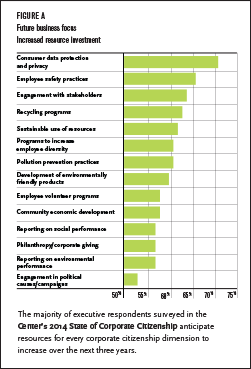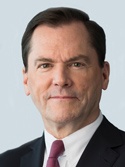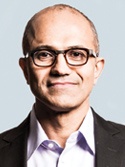From the corner office: perspectives on corporate citizenship
- Mon Jun 08 15:05:00 UTC 2015
- Katherine V. Smith
Business leaders are aware of the increasingly significant role that corporate citizenship can play in overall business strategy, and how—if effectively aligned—investments can improve performance.

According to the Center’s 2014 State of Corporate Citizenship study, the majority of executive respondents view corporate citizenship as a way to achieve strategic corporate goals and they expect its importance to increase in the future. In fact, for the first time in the decade that the Center has conducted the study, the majority of executives anticipate resources for every corporate citizenship dimension to increase over the next three years.
It’s clear that executives understand the value of corporate citizenship and are investing in processes and programs that deliver both business and social value. Here, top executives offer their perspectives on how corporate citizenship is helping them create not only a world in which we want to do business, but a world in which we want to live.
 Michael Dell—Chairman and Chief Executive Officer, Dell
Michael Dell—Chairman and Chief Executive Officer, Dell
To achieve major milestones in corporate citizenship and obtain long-term value, companies must create bold visions and set clear goals. At Dell, those objectives are collected under one ambitious umbrella—their Legacy of Good Plan.
“The changes headed our way require more than incremental progress. They demand meaningful, systemic change and, for businesses, that starts with a new mindset about corporate responsibility. We have to look beyond our walls to inspire sustainable practices throughout our entire ecosystem, making sustainability easier for our customers and partners.
That’s the 21st goal in our 2020 Legacy of Good Plan, and the one I’m most excited about. We want to develop a methodology for a 360-degree view of our environmental impact. For example, when we sell a server, we know the carbon footprint for its manufacture and operation. But what if that server is being used to support 100 remote workers who no longer drive to the office? How do we measure that? We want to understand the totality of our ability to make a positive difference.
If we can measure it, we can maximize it. And that’s a big opportunity for us all to work together to help ensure our collective future.”
 Thomas J. Falk—Chairman and Chief Executive Officer, Kimberly-Clark Corporation
Thomas J. Falk—Chairman and Chief Executive Officer, Kimberly-Clark Corporation
As a company that has been growing for more than a century, Kimberly-Clark knows about sustainable and socially responsible progress.
“At Kimberly-Clark, we make our vision to lead the world in essentials for a better life a reality by building a sustainable enterprise. For us that means delivering consistent growth as well as creating a strong culture and being committed to corporate social responsibility. We strive to innovate with proper regard for our environment. That is why we set five-year stretch goals to reduce our environmental impact and increase the positive impact on our communities.
We continuously ask: How do we go landfill free in all of our manufacturing? How can we consume less water in our processes? How can we create an equivalent amount of water in the communities where we operate that will provide for people in water-stressed areas? How do we reduce the total amount of greenhouse gases from our production? Then, we set aggressive goals for every one of our operations around the world, and we track our progress.
Behaving this way keeps us true to the values that Kimberly-Clark was built on. One hundred forty years ago, our founders believed in three things—manufacturing quality products, providing great service, and dealing fairly with our employees and communities. And we still believe in that today.”
 Jay Hooley—Chairman and Chief Executive Officer, State Street Corporation
Jay Hooley—Chairman and Chief Executive Officer, State Street Corporation
In addition to delivering important ESG outcomes, effective corporate citizenship creates lasting business value. That’s why at State Street, corporate citizenship is considered essential.
“Being socially responsible is both a moral and business imperative. Any company that doesn’t strive to be a good corporate citizen risks undermining its reputation and jeopardizing its profitability over the long run.
Employees, customers, shareholders, and other stakeholders want to work for, do business with, and invest in companies that take their social responsibilities seriously and have a positive impact on the world. In addition to more satisfied stakeholders, corporate responsibility makes for stronger communities and better economic growth prospects. For these reasons and many more, corporate citizenship is not just the right thing to do; it’s the smart thing to do.”
 Satya Nadella—Chief Executive Officer, Microsoft Corporation
Satya Nadella—Chief Executive Officer, Microsoft Corporation
Microsoft works to better the world by revolutionizing the ways in which people interact with it. During the company’s 2014 Annual Shareholder Meeting, CEO Satya Nadella revealed one crucial key to success.
“Diversity and inclusiveness is a critical topic for our time, for our industry, for Microsoft and it’s important to have candid conversation and, most importantly, robust action. Since 2006, we have transparently disclosed demographic (employee) data. This transparency helps us internally to both talk about diversity and inclusion and galvanize for action. We are focused on ensuring that Microsoft will be the best place to work for smart, curious people across cultures, genders, ethnicities, and lifestyles.
Our commitments:
- Equal opportunity and equal pay for equal work
- Develop a diverse talent base in Microsoft, and retain them as they grow
- And perhaps most importantly, a culture of inclusiveness
The business case for inclusiveness is clear. The sensibility that is required in order to build products that are loved by diverse groups of people is not going to be possible if you don’t have diversity in the workforce.
At Microsoft, we have truly played a central role in transforming almost every aspect of how people live, work, and play. I am excited about our future, and confident that we have the ambition, vision, and talent to deliver the innovation that will touch every individual and every organization in every corner of the globe.”
